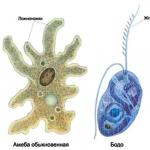Manganese is a fairly common substance in nature. However, it cannot be found in pure form, and as part of some ore compounds. He is also vital essential trace element for most plants and living organisms, including humans. Why does the human body need manganese? In what concentrations is it useful, and in what concentrations is it harmful? What products contain it?
The role of manganese in the human body
Why is manganese so important for the human body? First of all, it affects the work of our nervous system. is directly involved in the synthesis of neurotransmitters (physiologically active substances that transmit impulses between nerve cells). Manganese also has a beneficial effect on education and growth. bone tissue Together with calcium, it supports the immune system in resisting various infections, and stabilizes the digestive process.
Manganese is important for the human body for another reason. Assimilation of vitamins of group B, as well as C and E, fast healing tissues, brain function, growth and formation of new cells are impossible without its presence.
Most scientists are of the opinion that manganese is important for the human body, because it prevents the development of diabetes, diseases of cardio-vascular system And thyroid gland. It is a well-known fact that in people with diabetes, the percentage of manganese is 2 times less than in healthy people.
This trace element will help restore tone muscle tissue and sensitivity to limbs, prevent atherosclerosis, reduce activity bad cholesterol, adjust genitourinary system. During pregnancy, in moderate doses, manganese is necessary for correct formation fetus, and after childbirth promotes lactation.
Among other things, manganese is involved in the process of hematopoiesis. It can also reduce the effect of toxins on the body. People have known about this property for a long time, because in case of poisoning, a weak one is often taken to this day. These are the important functions that manganese performs in the body.

daily requirement
Scientists have established the daily intake of manganese. Its average value is about 0.3 mg per 1 kg of human weight.
For children, the rate is slightly reduced, and its minimum value should be at least 1-2 mg per day:
- Up to 7 years - up to 0.1 mg per 1 kg of weight.
- From 7 to 14 years old - from 0.09 mg per 1 kg of weight.
Women need 2.5-5 mg of this substance per day. And here physical activity, pregnancy and lactation require a greater intake of manganese in the body.
Men need a daily intake of at least 6 mg of manganese, and with an active lifestyle - up to 8.5.

Products containing manganese
If manganese is so important for the human body, then from what products can it be obtained? You can find them on the shelves of the most ordinary supermarkets. However, it is worth remembering that the maximum concentration of manganese is found only in unrefined, natural products that were made without the use of heat treatment.
Animal products contain a minimal amount of this substance, which makes it impossible to compensate for its deficiency in the body. Manganese contains:
- in all types of meat, except pork;
- in the kidneys;
- in fish;
- in crustaceans;
- in cheese.
Large concentrations of the substance are found in products of plant origin:
- in olive oil;
- in fruits - grapes and lemon;
- in vegetables - cabbage, carrots, cucumbers, radishes;
- in legumes - peas, beans;
- in greens - parsley and dill;
- in cereals - rye, wheat, millet, buckwheat, oatmeal, rice;
- in berries - cranberries, bird cherry, blueberries, strawberries, raspberries, black currants;
- in honey;
- in cocoa;
- in tea;
- in nuts.

Excess
Manganese is essential for our body. The health benefits and harms are directly determined by its concentration in the body. With an excess of manganese, iron absorption disorders often occur. But such trace elements as iron, phosphorus and calcium, on the contrary, inhibit its absorption. However, this does not apply to food, but to vitamin and mineral preparations that are prescribed by doctors. With uncontrolled intake of the latter, an imbalance of most important trace elements occurs.
Flaw
Deficiency in the body of one or another vitamin or microelement is not uncommon in our time. Quite often found in humans and deficiency of manganese. A few decades ago, this was an extremely rare occurrence.
The cells of our body are almost always subject to negative impacts environment, for example toxic. permanent nervous tension and stress cause the body to use more manganese to maintain the integrity of cell membranes. In addition, the deficiency of this trace element is associated with low consumption fresh vegetables, fruits, greens.
Nevertheless, manganese is a truly unique trace element, because if it long time does not enter the body, cells can inhibit its excretion to prevent its deficiency and the occurrence of a number of diseases. However, this effect is only temporary, a deficiency will occur if there is no supply of this substance.
Deficiency or lack of manganese negatively affects our health: fatigue increases, dizziness and weakness occur, muscles hurt, excess weight. Allergies, diabetes, joint diseases, bronchial asthma, epilepsy, sclerosis. In addition, it may develop which is associated with impaired immunity. In young women with a deficiency of this microelement, infertility develops, and in the elderly - osteoporosis. But children grow poorly, the development of the musculoskeletal system is inhibited.

Preparations containing manganese
IN therapeutic purposes doctors can prescribe the drug Turamine for manganese deficiency, which contains 25 mg of the substance in one tablet. Also contain manganese and multivitamin complexes, such as:
- "Vitrum";
- "Complivit";
- "Maxamin Forte";
- "Multi-tabs";
- "Oligovit";
- "Supradin".

Are there any contraindications?
Manganese is undoubtedly important for the human body. However, there are situations when drugs with its presence are unacceptable. This applies to people suffering from Parkinson's disease, as well as those working in production using manganese salts, for example, in a steel plant, in the electrical industry.
One of the trace elements is manganese. In the human body, its role is enormous: it is involved in many metabolic processes, hematopoiesis, promotes tissue growth, increases their tone, prevents the development of diabetes and thyroid diseases. However, not in the best way affects both its excess and its deficiency.
The human body contains more than thirty trace elements, many of which are in the group of essential, that is, vital for full functioning. These elements perform certain functions, the violation of which leads to a change in the development of the organism and its further destruction. Mineral elements are actively involved in the processes of human biochemistry, and any change in their balance leads to irreversible consequences. Therefore, maintaining and maintaining the availability mineral trace elements within certain limits - the basis normal functioning living organisms.
In a deep study of vitamins of groups C, B and E, it was found that with insufficient content manganese, these vitamins can be poorly absorbed. With an increase in the concentration of unrelated vitamins of these groups, they become toxic and poison the human body. Therefore, knowing which foods contain manganese is quite important. The amount of manganese in the most common products is shown in the table.
Manganese content in foods

| Product name | Manganese content in 1mg\100g | % DV in manganese per 200 g of product |
| Coffee beans | Over 90 | 100 |
| Various types of tea | up to 90 | 100 |
| Hot red pepper | 6,5 | 100 |
| 20 | 100 | |
| Wheat flour | up to 7 | 100 |
| edible chestnut | 4 | 100 |
| soy flour | 4 | 100 |
| Oat flakes | 3,6 | 100 |
| oat flour | 3,6 | 100 |
| Cocoa without heat treatment | 3,5 | 100 |
| Gelatin | 3 | 100 |
| Chocolate | 3 | 100 |
| raspberries | 3 | 100 |
| Coconut | 3 | 100 |
| Barley | 3 | 100 |
| Peas, dried beans | 3 | 100 |
| Spinach | 3 | 100 |
| Grape | up to 1 | 100 |
| Carrot | up to 1 | 100 |
| cucumbers | up to 1 | 100 |
| Asparagus | up to 1 | 100 |
| Turnip | up to 1 | 100 |
| Mushrooms | up to 1 | 100 |
| Potato | up to 1 | 100 |
| Tomatoes | up to 1 | 100 |
| Rhubarb | up to 1 | 100 |
| radish | up to 1 | 100 |
| Canned olives (unpasteurized) | up to 1 | 100 |
| Rye flour | up to 1 | 100 |
| Date fruit | up to 1 | 100 |
| Dessert plum | up to 1 | 100 |
| Beet | up to 1 | 100 |
| Black currant | up to 1 | 100 |
| Cauliflower | up to 1 | 100 |
| White cabbage | up to 1 | 100 |
| Cheese products, regardless of fat content | up to 1 | 100 |
| Yolk | up to 1 | 100 |
| kidneys | up to 1 | 100 |
| Meat (pork) | up to 1 | 100 |
| Celery | up to 0.2 | 20 |
| Non-synthetic honey | up to 0.2 | 20 |
| Olive oil | up to 0.2 | 20 |
| Crustaceans | up to 0.2 | 20 |
| Fish (red) | up to 0.2 | 20 |
| Lemon (fruit) | 0,005 | 0,25 |
| Mustard | 0,005 | 0,25 |
| Poultry meat | up to 0.005 | 0,25 |
| Veal | up to 0.005 | 0,25 |
| Beef | up to 0.005 | 0,25 |
| Milk | 0,0004 | 0,02 |
The table shows that manganese in products is concentrated unevenly. In meat and dairy products, its content is relatively small, but in vegetables and fruits it is more than enough. Therefore, the use of greens in daily diet nutrition, reduces the risk of developing rickets, strengthens the skeleton and central nervous system.
Products containing manganese must be included in the daily diet, as this mineral is essential for the proper and harmonious development of cells. depends on its presence in the body. right job nervous system. Manganese is involved in the production of neurotransmitters that are responsible for the impulse transmission of nerve fiber signals. Manganese is also essential in the formation of bone tissue and cartilage.
The immune system, with the support of manganese compounds, can better resist pathogenic bacteria the surrounding world. Manganese prevents the formation of fatty deposits in the liver. A balanced amount of manganese has a beneficial effect on thyroid gland, contributes to the prevention of diabetes and the circulatory system.
The body of an adult consumes about 2-9 mg of manganese per day, on average up to 0.3 mg per kilogram of body weight, so each person can independently calculate the required minimum of this mineral and maintain its presence in their diet.
In athletes and people with great physical exertion, this rate naturally increases. During pregnancy and lactation, this rate is also significantly higher and is regulated depending on physical condition women and the peculiarities of personal nutrition.
Manganese deficiency in diet

The lack of manganese in the body does not appear instantly, its deficiency has a slow deterioration in the state of the body. The main symptoms are:
- general weakness;
- increased irritability;
- constant feeling of fatigue;
- frequent runny nose;
- weight gain;
- seizures in adolescents.
Mineral deficiency often leads to anemia various forms, impaired reproductive function, regardless of gender, poor growth in children, weight loss for no reason. Irreplaceable loss of manganese can lead to various allergies, asthma, rheumatism, diabetes, sclerosis and serious illness associated with impaired immune function. Also, the exclusion from the diet of foods with a high presence of manganese leads to various violations the human psyche.
Manganese excess or overdose
Excess manganese in the body can be very dangerous. Since saturation with manganese causes such disorders as:
- deterioration and further deposition of iron in cells;
- high risk of anemia;
- a sharp deterioration in the functioning of the nervous system;
- decreased calcium conversion;
- dysfunction of the musculoskeletal system.
Symptoms that signal an excess of manganese - worsening or total loss appetite, the occurrence of hallucinations, memory impairment, drowsiness, pain, convulsions.
Manganese and harmful production
People employed in hazardous industries are particularly susceptible to an excess of manganese. The bulk of such people work at steel-smelting and oil refineries, electrical engineering stations, mines for the extraction of mineral ores, and welded industries. Coffee is contraindicated for these categories of the population, green tea, cocoa and other products with great content manganese.
Also, these people are strongly advised to increase the consumption of foods that are rich in vitamin D. Or, the maximum of the consumed foods, to subject them to prolonged heat treatment. Manganese in foods with a high concentration also leads to the accumulation of phosphorus, iron, copper and zinc in the body.
Recent studies and experiments by scientists have proven that manganese is involved in almost all body processes. Its role is difficult to overestimate for the harmonious development of man. The indicator of the level of this mineral should be among the mandatory. With a balanced presence of manganese, the immune system is much more successful in fighting harmful bacteria and dangerous viruses. The active participation of manganese compounds stimulates metabolism, work gastrointestinal tract. The influence of manganese is very important during the recovery period after injuries and surgical intervention, as it is involved in the restoration of bone tissue.
In the context of emerging changes in the environment, deterioration of the immune system future generations, the development of artificial growth stimulants, both animal and vegetable, the balance of micro-, macrominerals in the human body is very important. And how much this ratio will affect health depends solely on people and their nutrition.
The role of manganese in nature is in the proper development of the cells of the human body. This element takes part in all vital important processes organism. Presence given element is an prerequisite for the full absorption of thiamine (vitamin B1), iron and copper, which are necessary for the implementation of the function of hematopoiesis. Manganese organizes the process of building body cells, including nerve cells, so its role in providing healthy lifestyle life is irreplaceable.
Manganese is widely distributed in nature, Earth's crust It is also rich in this mineral, but this element is not found in its pure form, but is included in many ores in the form of special compounds.
The main functions of manganese in the body
- Positively affects the functioning of the central nervous system;
- Promotes the production of neurotransmitters (physiologically active substances in the body responsible for the transmission of nerve impulses);
- The influence of manganese on the formation of bone tissue was noted;
- Responsible for maintaining immunity, protecting the human body from infections;
- The influence of manganese on the process of digestion and normal metabolism was noted.
Video from internet
What foods contain manganese
To maintain the optimal amount of the mineral in the human body, you should know which foods contain manganese. It is thanks to one's own knowledge that one can provide the body balanced diet and prevent shortage and overabundance of the element. Products containing manganese are available and widely available. Foods containing this mineral can easily provide the body with the necessary daily dosage. This is due to the fact that the products contain required amount this element.
100 g of nuts contain 0.2-0.4 mg of manganeseManganese is preserved only by unrefined, organic products not subjected to heat treatment. For people who have an excess of manganese, it is recommended that foods rich in this element be handled carefully.
Animal sources
Animal sources contain a minimal amount of manganese, so it is almost impossible to make up for the deficiency of this mineral with their help.
- Meat - all kinds, except pork;
- Offal - kidneys;
- Fish, crayfish and crabs;
- Dairy products - cheese.
plant sources
A large number of Manganese is found in plant food sources, mainly in grains, legumes, berries and greens.
- Olive oil;
- Fruits - lemon, grapes;
- Vegetables - cauliflower and white cabbage, carrots, cucumbers, radishes;
- Legumes - peas, beans;
- Greens - dill, parsley;
- Cereals - rye, wheat, millet, buckwheat, oatmeal, rice;
- Berries - cranberries, bird cherry, blueberries, strawberries, raspberries, black currant;
- honey and cocoa;
- All types of tea and nuts.
Daily norms of manganese
Daily rate manganese for an adult organism is on average from 0.2 mg to 0.3 mg per 1 kg of human weight.
Daily Value for Children
Average children's body should receive at least 1-2 mg per day.
- 5-7 years - from 0.07 to 0.1 mg / kg;
- 7-14 years - from 0.09 mg / kg.
Daily Value for Women
female body needs 2.5 to 5 mg of manganese per day. Physical exercise, active image life, the period of pregnancy and lactation, require large reserves of this mineral from the body.
The lack of an element in pregnant women can lead to congenital pathologies fetus, such as abnormal limb development, joint fusion, and skull deformity.
Daily Value for Men
Adult male body needs 6 mg of manganese per day, and with physical activity these needs are 7-8.5 mg.
Lack of manganese in the body
deficiency of manganese human body gives rise to pathological conditions that are difficult to correct. Deficiency of this element in humans leads to consequences:
- Weakness, irritability, fatigue;
- Bronchospasm and chronic runny nose;
- Arthrosis and osteoporosis - the elderly;
- Overweight;
- Convulsions in children and psychomotor retardation.
Currently, the deficiency of this mineral is a fairly common phenomenon, which is associated with improper and unbalanced nutrition, as well as environmental pollution. stressful situations also negatively affect the reserves of the element, spending them to ensure the integrity of cell membranes.
Excess manganese in the body
The role of manganese in the human body is very important, but its excess can lead to serious consequences, after which even a young body is very difficult to recover. An excess of manganese in the body can lead to a deterioration in iron absorption and the development of anemia, a deterioration in the state of the nervous system, and a violation of calcium absorption.
In case of an overdose of this element, foods rich in it should be excluded from the diet. Symptoms of an overdose of this mineral are typical for people with Parkinson's disease, as well as workers in hazardous industries: steelmaking, electrical stations and oil refineries.
Preparations containing manganese
Manganese preparations should be used only after consultation with a specialist who, in without fail must determine its content in the body. Uncontrolled reception similar drugs can lead to micronutrient imbalance, which is accompanied by characteristic symptoms.
- Stay Healthy - allows you to fight weakness and depression. The composition contains other minerals and vitamins, and is the best complex drug to date, containing manganese;
- Centuri 200 - has an effect on strengthening the immune system, supports the human body in the fight against infections. plays important role in the elimination of manganese deficiency;
- Manganese II acetate is an ideal catalyst in organic synthesis.
Manganese: beneficial features and content in products
Useful properties of manganese
The human body contains 10 to 30 grams of manganese. It is found in organs such as the pancreas, liver, and kidneys. The body's daily requirement for this trace element is 0.2–0.3 mg per day per 1 kg of body weight.
Manganese is involved in redox processes. In addition, it is necessary for the formation of connective and cartilage tissue, normal operation thyroid gland. It also ensures the functioning of the nervous system and the brain, affects fat metabolism and the sugar content in human blood, improves the condition of the hair. This trace element has restorative properties, is part of antianemic drugs.
Manganese deficiency in the body can cause the development of diseases such as arthrosis, osteoporosis. If a child does not receive enough manganese, developmental delay occurs. It should be noted that its excess in the body can adversely affect health. If the amount of manganese consumed is much higher daily requirement, the risk of developing anemia increases, the state of the nervous system worsens.
There are also contraindications to the use of this trace element. For example, foods containing manganese should not be consumed by people who suffer from Parkinson's disease. It can also be excluded from the diet in case of individual intolerance.
Foods rich in manganese
The leaders in the content of manganese are tea, cocoa, cranberries, peppers, wheat flour. Slightly less manganese in spices such as saffron, cardamom, cinnamon, ginger. Nuts are also rich in them (pistachios, hazelnuts, almonds, walnuts).

Bath with potassium permanganate: cooking right
- More
Manganese is also present in cereals and grains, but its amount is lost during threshing.
A small amount of manganese is found in mushrooms, pasta, dill, black currant, raspberry, carrot, bird cherry and wild strawberry. In honey, olive oil and fish, the content of this trace element is 0.5–2 mg per 1 kg of fresh weight. Slightly less manganese in milk and meat.
Human nutrition should be complete and balanced, so try to eat not only those foods that contain manganese, but also others.
You can compensate for the lack of manganese by taking vitamin and mineral complexes, as well as with the help of special preparations, the basis of which is this chemical element.
The role of manganese in the human body
Functions of manganese:
- It contributes to the normalization of the functions of the central nervous system (central nervous system), participates in the production and formation of neurotransmitters.
- Accelerates the elimination of toxins and free radicals from the body.
- Improves adrenal function, enhances the action of insulin.
- Beneficial effect on cell membranes improves their structure.
- Takes part in the synthesis of thyroxine (thyroid hormone).
- Affects bone and muscular system: contributes to the formation of muscle tissue, proper development bones and cartilage.
- Increases the absorption of glucose, regulates blood sugar levels.
- Participates in the synthesis process fatty acids, lipid utilization. With a normal content of manganese in the body, fats are used more fully.
- Protects the liver from cholesterol and subsequent fatty degeneration. Promotes the deposition of glycogen in liver cells.
- Improves the absorption of B vitamins,,, copper and choline.
- Affects reproductive function maintains normal estrogen levels.
- Participates in the production of many enzymes.
- Helps maintain energy balance.
- Helps to increase immunity, is necessary for the production of interferon.
- Improves blood clotting.
Manganese is used in the treatment of diseases of the nervous system (Parkinson's, epilepsy, chronic fatigue). Preparations with manganese are prescribed for people with diseases of the joints, liver, thyroid gland, reproductive system.
Excess manganese can be harmful. For example, in Chile, where there are many manganese deposits, workers are often diagnosed with a syndrome called "manganese madness." Movement coordination is disturbed, anorexia, insomnia develop, hallucinations appear, complete damage to the central nervous system
Main sources of manganese

Animal sources:
- Meat (excluding pork).
- Offal (kidneys, liver).
- Cheese, milk, eggs, cottage cheese.
- Fish and seafood (crabs and crayfish).
It should be noted right away that manganese in animal products is contained in minimal quantities.
Plant sources (Table 1):
- Olive and linseed oil.
- Greens, white and cauliflower, cucumbers, radish. As well as carrots, beets, broccoli, spinach, etc.
- Nuts (hazelnuts, walnuts, peanuts, pine nuts, cashews, pistachios, etc.).
- Cereals: wheat, millet, oatmeal, rice and buckwheat.
- Legumes (soybeans, peas, beans, lentils).
- Fruits (lemon, grapes, apples, pineapple, apricot, cherries, etc.).
- Berries (lingonberries, wild roses, blueberries, bird cherry, currants, raspberries, strawberries).
- Cocoa grains, green tea.
- Mushrooms.
Table 1. Manganese content in products
| Hazelnut | 4,2 |
| pistachios | 3,8 |
| Soya | 1,42 |
| Wheat | 1,2 |
| Rice | 1,1 |
| Spinach | 1 |
| A pineapple | 0,75 |
| Champignon | 0,7 |
| Beet | 0,6 |
| Rose hip | 0,5 |
| White cabbage | 0,35 |
| Potato | 0,35 |
| Strawberry | 0,3 |
| Apricot | 0,25 |
| Tomatoes | 0,22 |
| Carrot | 0,15 |
| Celery | 0,1 |
| Cucumber | 0,08 |
From plant sources, you can get 7-10 mg of manganese per day. It is enough to include vegetables and nuts in the menu. It is worth remembering that this element is best absorbed in tandem with zinc.
It is more difficult to preserve manganese in food: it is destroyed during refining and heat treatment. It is recommended to consume more raw vegetables, fruits, nuts, natural juices. Choose unprocessed cereals, subject meat and fish to a gentle treatment (steamed or stewed). The daily norm of manganese is given in Table. 2.
A person needs higher dosages of manganese if:
- He suffers from diabetes or diseases of the cardiovascular system.
- With nervous overload.
- With an unbalanced diet.
- If reproductive function is impaired.
- With physically hard work or sports loads.
- In some cases during pregnancy.
Table 2. Daily intake of manganese.
Interaction with other substances

Interaction with other nutrients:
- Manganese improves the absorption of B vitamins, and.
- Works closely with copper, these are paired elements in our body.
- Phosphorus and calcium are considered stronger elements. They block the absorption of manganese.
- Manganese inhibits zinc and copper and may prevent their absorption.
- With a lack of iron, the body absorbs manganese faster, an excess of iron blocks the absorption channels of the element.
- Magnesium-containing preparations are also undesirable to be taken simultaneously with manganese.
- Cesium, vanadium and some other compounds displace manganese from the body.
manganese deficiency

Possible reasons manganese deficiency:
- Increased physical and sports activities.
- Unbalanced diet.
- Work in hazardous industries.
- Increased psycho-emotional stress.
- Violation of metabolic processes.
- Violation hormonal background(ovarian dysfunction, menopause, etc.).
- Alcohol abuse.
Manganese deficiency symptoms:
- Frequent depression, apathy, loss of strength.
- Deterioration mental activity, memory.
- Disturbance of coordination of movements, convulsions and spasms in the muscles.
- The first symptoms of osteoporosis or arthritis may begin to appear. The condition of the skin worsens (rashes appear, pigmentation is disturbed), hair and nails grow more slowly.
- Infertility develops, because the hormonal background is disturbed.
- Premature aging.
- Children slow down development.
- Immunity decreases, a tendency to allergies is observed.
- Increased risk of cancer.
First of all, you need to go full examination and adjust your diet. Take manganese-containing preparations only as directed by your doctor in the prescribed dosages. 40 mg element - toxic dose. It can only be obtained through the abuse of drugs or in hazardous production. Go over the limit by consuming regular products nutrition is almost impossible.
Excess manganese

Excess manganese is diagnosed in rare cases:
- If a person has worked in hazardous production for many years.
- His metabolic processes are disturbed.
- He abused medicines with manganese.
Symptoms of an excess of a trace element:
- Weakness, tendency to depression.
- Memory deterioration.
- Violation of gait, muscle atrophy, movements become unnaturally slow and constrained.
- Parkinson's disease may develop.
- Manganoconiosis.
- Violation of the functions of the respiratory system.
- Enlargement of the liver.
- Sexual impotence.
Preparations with manganese

IN medical practice use the following forms manganese: sulfate, gluconate and chloride (in tablet or encapsulated form), as well as potassium permanganate or the well-known "potassium permanganate". It is used not only for poisoning, but also for the treatment of wounds.
With magnesium deficiency, the following drugs are prescribed:
- Biobalance of marine calcium. Contains calcium, manganese, copper, vitamin C and. The package contains 100 tablets of 600 mg.
- Turamine manganese. It is produced in capsules, weighing 0.25 g. There are 90 pieces in a package. Contains manganese gluconate.
- StayHealthy. The package contains 90 tablets, weighing 0.43 g. The composition includes magnesium sulfate, a number of vitamins and trace elements.
- Vitamin preparations. Manganese at a dosage of 2.5 mg is included in a number of vitamin supplements: Multi-Tabs, Vitrum, Calcemin, Supradin, Oligovit, Complivit, etc.
Cocoa beans are an excellent source of manganese. However, they still have a lot of features that you obviously did not know about before (watch the video below).





